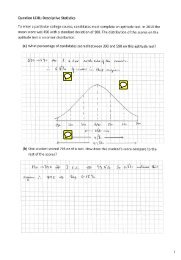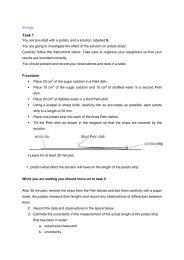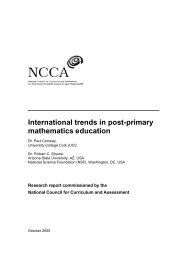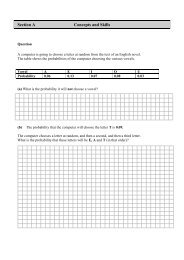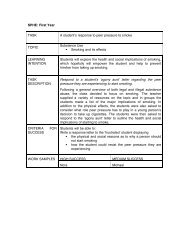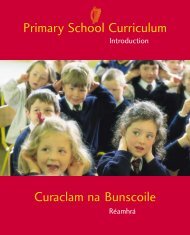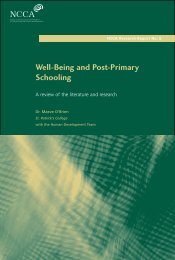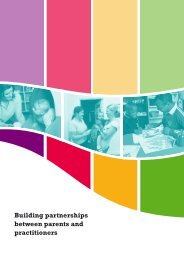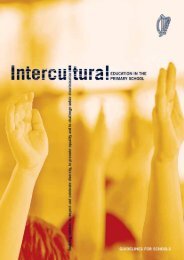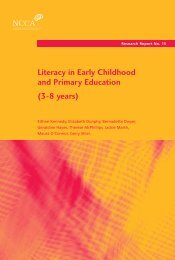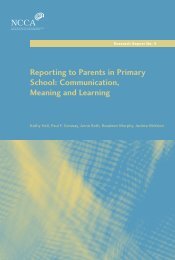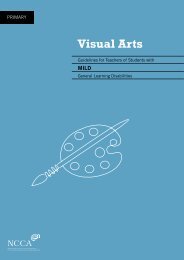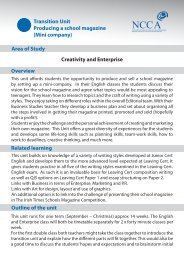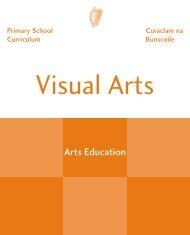Up and Away - National Council for Curriculum and Assessment
Up and Away - National Council for Curriculum and Assessment
Up and Away - National Council for Curriculum and Assessment
Create successful ePaper yourself
Turn your PDF publications into a flip-book with our unique Google optimized e-Paper software.
156<br />
Making multiple-choice questions<br />
Class Organisation<br />
Pairs/small groups.<br />
Theme<br />
Use <strong>for</strong> any theme.<br />
Type of activity<br />
Pair/group writing.<br />
Materials needed<br />
Dictionaries.<br />
Photocopies of Worksheets A<br />
<strong>and</strong> B.<br />
Aims<br />
Develop dictionary skills.<br />
Build confidence in using a<br />
dictionary.<br />
Exp<strong>and</strong> vocabulary range.<br />
Develop writing skills.<br />
Develop speaking skills.<br />
Variation<br />
The activity can be used to revise (or extend)<br />
pupils’ vocabulary range relating to specific<br />
themes, as with Worksheet A which loosely<br />
focuses on the home.<br />
Alternatively, it can be used purely as a basis <strong>for</strong><br />
developing confidence in using a dictionary<br />
with no restrictions placed on the words pupils<br />
choose.<br />
Pupils at a higher level of proficiency can write<br />
their own definitions <strong>for</strong> the words.<br />
Focus Time<br />
60 minutes over<br />
two sessions.<br />
Suitable <strong>for</strong><br />
Third class <strong>and</strong><br />
above.<br />
Approach<br />
1. Put pupils into pairs/small groups <strong>and</strong> distribute one<br />
dictionary <strong>and</strong> copies of Worksheet A to each pair/group.<br />
2. Demonstrate the activity by working through number 1.<br />
Make sure each pair/group finds the word ‘decorate’ in the<br />
dictionary <strong>and</strong> checks it against the three possibilities on<br />
Worksheet A.<br />
3. Ask pupils to complete the exercise. Monitor – make sure<br />
that the members of each pair/group work together <strong>and</strong><br />
share the dictionary. Prompt ideas <strong>and</strong> help with dictionary<br />
use where necessary.<br />
4. Explain to the class that they are going to use the dictionary<br />
to find five ‘difficult’ words <strong>and</strong> make the same type of<br />
activity.<br />
5. Distribute one or two sheets of paper <strong>and</strong> encourage each<br />
pair/group to work together to find words <strong>and</strong> to write the<br />
task.<br />
6. Monitor. When ready, h<strong>and</strong> out one copy of Worksheet B<br />
per pair/group, <strong>and</strong> ask pupils to copy their work.<br />
Observations<br />
Note that the activity is based on dictionary<br />
definitions. It is not a free-writing exercise.<br />
Encourage pupils to find ‘difficult’ words,<br />
especially if the finished page is to be circulated<br />
to other classes/groups.<br />
As pupils develop their own multiple-choice<br />
questions, make sure that everyone participates<br />
in looking up <strong>and</strong> selecting the words to use,<br />
<strong>and</strong> in creating the false definitions. More<br />
involvement in the decision-making process<br />
increases the need <strong>for</strong> pupils to communicate.



